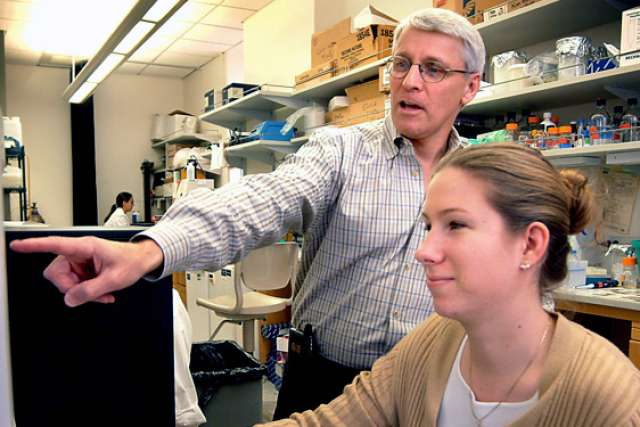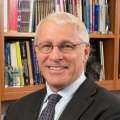Dr. Owen Witte, UCLA Jonsson Comprehensive Cancer Center member and distinguished professor of microbiology, immunology, and molecular genetics, has been selected by the American Association for Cancer Research (AACR) to receive its 55th annual AACR G.H.A. Clowes Memorial Award. The high honor will be awarded at the AACR Annual Meeting 2015, to be held in Philadelphia, April 18–22.
Witte, who is also a Howard Hughes Medical Institute investigator, fellow of the AACR Academy, is being recognized for his many contributions to the understanding of human leukemias, immune disorders and epithelial cancer stem cells. His pioneering work, which contributed to the development of several approved targeted therapies, has transformed the lives of patients with Philadelphia chromosome-positive leukemias and B-cell malignancies.
The AACR and Eli Lilly and Company established the G.H.A. Clowes Memorial Award in 1961 to honor Dr. G.H.A. Clowes, a founding member of the AACR and research director at Eli Lilly. This award recognizes an individual with outstanding recent accomplishments in basic cancer research.
“Much progress has been made in the area of personalized cancer medicine due to the dedication of scientists and physicians around the world, many of whom I’ve had the pleasure of working with through the AACR’s innovative initiatives,” said Witte. “But much more work is needed as we seek to understand cancer, which is not a single disease but rather many diseases that develop differently. I thank the AACR for their leadership in this effort and am honored to receive the Clowes Memorial Award.”
Witte’s innovative work helped revolutionize modern cancer treatment by defining tyrosine kinases as crucial drug targets in human disease. Most notably, he pinpointed the molecular consequences of the Philadelphia (Ph) chromosome abnormality present in chronic myelogenous leukemia (CML) and related types of leukemia and defined the tyrosine kinase activity of the ABL gene product. These findings played a crucial role in the subsequent development of ABL kinase-targeted therapies, including imatinib (Gleevec), which remains the front-line treatment for Ph-positive CML.
More recently, Witte, who is founding director of UCLA’s Eli & Edythe Broad Center of Regenerative Medicine & Stem Cell Research, has focused on defining the epithelial stem cell populations that contribute to prostate cancer. He is currently using mass spectrometry approaches to identify kinases that could be potential therapeutic targets for human prostate cancer.
Witte will present his lecture, “Finding Therapeutic Targets for Aggressive Prostate Cancer,” Monday, April 20, 5:30 p.m. EST, in the Grand Ballroom of the Pennsylvania Convention Center.




